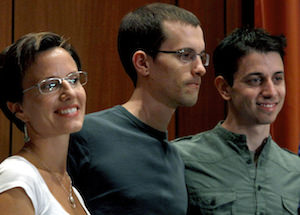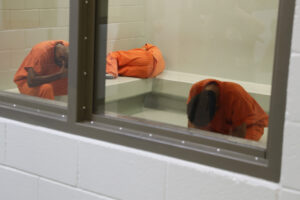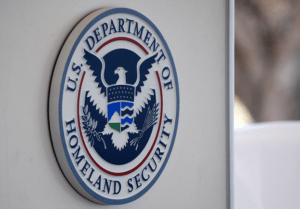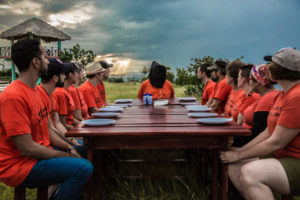Truthdigger of the Week: Shane Bauer
Prisoners are among the "least of us" in America. After spending two years learning what they go through, investigative reporter Shane Bauer is raising his voice in their defense.
Every week the Truthdig editorial staff selects a Truthdigger of the Week, a group or person worthy of recognition for speaking truth to power, breaking the story or blowing the whistle. It is not a lifetime achievement award. Rather, we’re looking for newsmakers whose actions in a given week are worth celebrating. Nominate our next Truthdigger here.
In summer 2009, three American hikers were seized by Iranian border guards on suspicion of being spies trying to enter the country through Iraqi Kurdistan. Though the authorities produced no evidence of the spying charge, Shane Bauer, Joshua Fattal and Sarah Shourd were convicted of illegal entry and espionage and sentenced to eight years in prison at the Evin detention center in northern Tehran.
The three were released early on a bail exceeding a total of $1 million. Shourd spent just over a year in prison while Bauer and Fattal endured 26 months, four of which Bauer spent in solitary confinement. He described his isolation as the “worst” experience of his life.
Months after his release, Bauer began investigating the use of solitary confinement in America. In late 2012, he published a major story on the issue in Mother Jones magazine called “Solitary in Iran Nearly Broke Me. Then I Went Inside America’s Prisons,” from which nearly all of the figures cited in this article are taken. The Mother Jones piece and the video that accompanied it took audiences into Pelican Bay State Prison in Northern California, one of the country’s roughly 60 “supermax” detention centers, alleged to hold the state’s “worst of the worst.”
Amid a hunger strike by 30,000 California prisoners and roughly 100 at Guantanamo Bay detention center to protest prisoner isolation, jail conditions, and being held without trial, respectively, Bauer appeared on “Democracy Now!” on Friday to give Americans a straightforward and intimate view of life behind bars.
Pelican Bay contains one of the state’s five SHUs, or segregated housing units, which is official prison language for solitary confinement. In California, 4,000 people are held in solitary, and in Pelican Bay, 94 percent of inmates are housed alone. More than 80,000 people were locked up in solitary confinement in the United States in 2005, the last time the federal government gave such figures. Keeping prisoners in isolation is expensive. Pelican Bay spends at least 20 percent more to incarcerate a person in solitary, an extra $12,312 per prisoner per year, or $14 million annually. Eighty-nine inmates at Pelican have been kept “in the hole” for 20 years or more. Louisiana has held two members of the Black Panthers in solitary confinement for 40 years.
According to the United Nations, keeping anyone in solitary for more than 15 days is “torture or cruel, inhuman or degrading punishment.” The American Civil Liberties Union agrees that long-term isolation is torture. So do Physicians for Human Rights and the Center for Human Rights and Constitutional Law. In 2012, the latter filed a petition with the United Nations claiming just that. Human Rights Watch affirms that “cruel, inhuman and degrading treatment” of prisoners is a violation of international law.
Bauer shows us that basic rights of expression and association don’t exist in Pelican Bay prison. Many inmates are placed in solitary confinement for being charged with being associated with a prison gang. The process of conviction is flimsy. “To validate an inmate as a gang member,” Bauer writes in his Mother Jones article, “the state requires at least three pieces of evidence, which must be ‘indicative of actual membership’ or association with a prison gang in the last six years. In other words, prisoners are punished for the suspicion of belonging to a social community.
“California officials frequently cite possession of black literature, left-wing materials, and writing about prisoner rights as evidence of gang affiliation,” Bauer writes. “In the dozens of cases I reviewed, gang investigators have used the term ‘[BGF] training material’ to refer to publications by California Prison Focus, a group that advocates the abolition of the SHUs; Jackson’s once best-selling Soledad Brother; a pamphlet said to reference ‘Revolutionary Black Nationalism, The Black Internationalist Party, Marx, and Lenin’; and a pamphlet titled ‘The Black People’s Prison Survival Guide.’ This last one advises inmates to read books, keep a dictionary handy, practice yoga, avoid watching too much television, and stay away from ‘leaders of gangs.’ “
Other qualifying evidence includes a photo in which a prisoner appeared with a current gang member — even if the associated person wasn’t in a gang at the time — and the appearance of a suspect’s name in the cell of a known gang member.
Gang membership is not illegal in the United States. The right to associate is protected by the First Amendment. But prisons like Pelican Bay treat simple alleged association with a member as a very serious crime. Bauer writes that it carries a much heavier penalty than stabbing someone or even murder. An inmate who murders a guard can get no more than five years in the SHU. Inmates who killed no one while in prison can be kept in solitary for much longer.
Officers at Pelican Bay told Bauer that prisoners are kept in isolation for safety and that the practice has reduced violence in the form of “racial strife, stabbings and killings.” In fact, the “rate of violent incidents in California prisons is nearly 20 percent higher than when Pelican Bay opened in 1989.”
David Fathi, director of the American Civil Liberties Union’s National Prison Project, says the SHU “is a system that has no place in a constitutional democracy.” California’s policy, he says, is “a form of guilt by association that is completely foreign to our legal system. Prison administrators have absolute power, and that is a recipe for abuse and violation of rights.”The trampling of those rights is visible in the psychological states of many isolated prisoners. “A 2003 study of inmates at the Pelican Bay SHU by University of California-Santa Cruz psychology professor Craig Haney found that 88 percent of the SHU population experiences irrational anger, nearly 30 times more than the US population at large,” Bauer writes. Haney says that every study of the psychological effects of involuntary solitary confinement has shown “negative psychiatric symptoms after 10 days.” A full 41 percent of SHU cases reviewed by him reported hallucinations while twenty-seven percent had suicidal thoughts. The California prison system’s own records show that “from 2007 to 2010, inmates in isolation killed themselves at eight times the rate of the general prison population.”
These hellish conditions have 30,000 inmates across California waging a hunger strike. Those prisoners confirm that being held in isolation amounts to torture. Bauer has no doubt heard from some of the strikers.
“Every day,” he wrote in Mother Jones, “I come home to a new stack of letters from prisoners—our hostage story, it seems, is best known inside America’s penitentiaries. For a while, I try to respond to each one, but as the weeks and months pass, they start to pile up. I become afraid of them and all the sorrow they contain. They take me back to my own time in solitary—and how can I go back there every day?”
“One morning, I sit down at my desk and look at the stack of envelopes slowly taking it over. I need to write these people back. I know what it’s like to wait for word from the outside. Some of them remind me of myself while I was locked up, their whole lives bent on staying sane. They write. They read. They exercise. They meditate. Others make me think of what I would have eventually become. Their letters don’t make sense. They write me constantly, desperately. They are broken.”
Americans in general have little sympathy for people placed behind bars on convictions of crimes. “Lock him up and throw away the key” is a phrase every man, woman and child knows. As far as civil rights are concerned, America’s prisoners are regarded as what the Jesus Christ figure recognized as the “least of us.” Shane Bauer was once one of them. For not forgetting them, and for raising his voice in their defense, we honor him as our Truthdigger of the Week.
Your support matters…Independent journalism is under threat and overshadowed by heavily funded mainstream media.
You can help level the playing field. Become a member.
Your tax-deductible contribution keeps us digging beneath the headlines to give you thought-provoking, investigative reporting and analysis that unearths what's really happening- without compromise.
Give today to support our courageous, independent journalists.




You need to be a supporter to comment.
There are currently no responses to this article.
Be the first to respond.